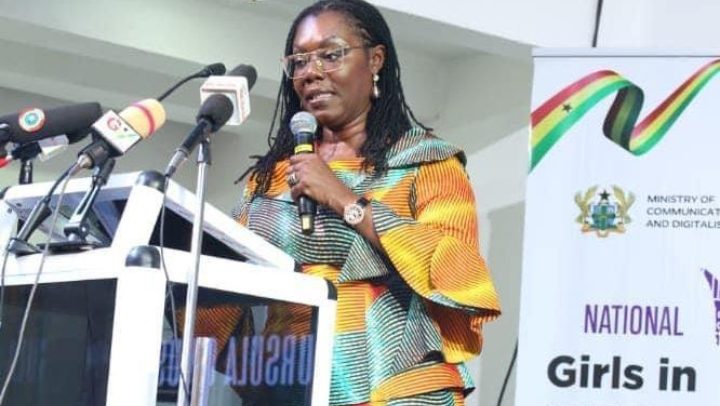Minister for Communications and Digitalisation, Ursula Owusu-Ekuful has stated that digitalisation is the game changer to grow Ghana’s economy and bridge the women’s gap in science and technology.
“For the first time in the history of the National GIICT Initiative, this year, our target is to celebrate the GIICT Initiative in five Regions namely: Bono East, Bono, Ahafo, Savannah and Northern.”
“In each region, our objective is to train 1, 000 young girls and 100 ICT/STEM teachers in basic computing, coding, scratch HTML etc. and at the end of the year, we would have trained 5, 000 girls and 500 ICT/STEM teachers doubling the number we have trained in the past 10 years,” she explained.
She indicated that these girls were selected from schools in all districts in the beneficiary regions in order to let every district feel the impact of these digital maidens.
“What a difference this will make. There is no doubt that digitalisation is the game-changer and with our additional function of digitalisation. We are determined to grow our digital economy at all costs,” Mrs. Owusu-Ekuful said at the climax ceremony of girls in ICT programme in the Bono Region.
She was delivering the keynote address at the event, during which the Minister, who is also the MP for Ablekuma West, said digital technologies can make manufacturing more productive and less resource-intensive, and supply chains more resilient.
According to her, these changes can also enable the widespread integration of growth and development and see to the successful implementation of digital drive devices to enhance the economy at all cost, through the provision of modern technology among other areas.
Heavy Investment
She further revealed that the government is keen to ensure that the digital economy is safeguarded for younger ones and to promote more investment in the country.
To this end, there will be more investment through education campaigns with faith-based organisations on internet safety in both urban and rural communities in all the 16 regions.
According to her, the theme for this year’s Girls-in-ICT programme: “Access and Safety” is an indication of the attention that the government has given to digital safety since the economy is growing digitally
She, therefore, assured participants that more digital equipment would be provided for various schools to use as well as ensuring that there is adequate safety for users online.
This is to ensure that the country attracts the best form of investments in the future.
“Digital tools have become pivotal in the new emerging world and we can’t afford to leave the girls behind. This year marks 10 years since the beginning of the initiative globally and in Ghana, our target for the first time is to do this in five regions; it has never been done before. Our objective is to train STEM teachers in basic ICT, coding and among others.”
Mentorship
She disclosed 1,000 girls are benefiting from the Bono Region’s programme, which is part of the quest by the government to bridge the gender gap in technology with support from the Ghana Investment Fund for Electronic Communication (GIFEC).
The selected schools, drawn from all the 12 districts in the region, participated in the mentorship programme with support from the Regional Education Directorate.
Some teachers were also trained as part of the initiative to impact the knowledge to other students that may not get the opportunity to participate.
Chairperson of the mentorship programme, Dr. Seyram Blossom Setufe, who is also the Acting Department Head of the Fisheries and Water, urged the beneficiaries to strive to become scientists and IT experts in the future.
The participants were taken through training in coding, creation of websites, computer games, interactive arts, mobile apps development, and animation stories, using various programming languages.
She challenged the girls to stay focus and develop interest in ICT subjects.
Dr. Mercy Badu from the Department of Chemistry at the Kwame Nkrumah University of Science and Technology exposed the girls to some tips that will support their learning process in the field of science and ICT.
She said there are limited ladies in the field which therefore requires the need to bridge the gap.
Other mentors includes Juanita Ahia Quarcoo, Lecturer at the Department of Computer Science at Sunyani Technical University; and Faiza Umar Bawah, Lecturer Department of Science and Informatics at University of Energy and Natural Resources.
Female Engineers from MTN were given the platform to share some experiences with the girls as well.


